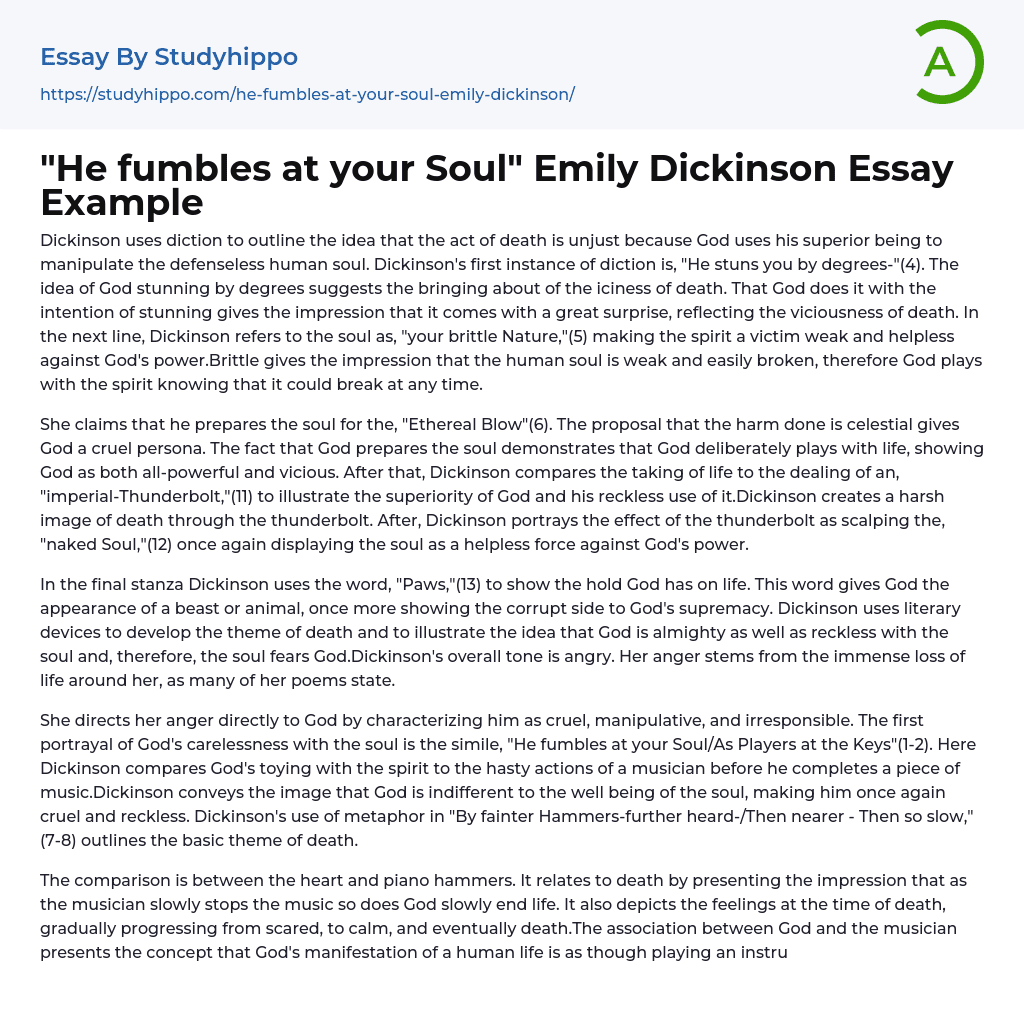Dickinson uses diction to outline the idea that the act of death is unjust because God uses his superior being to manipulate the defenseless human soul. Dickinson's first instance of diction is, "He stuns you by degrees-"(4). The idea of God stunning by degrees suggests the bringing about of the iciness of death. That God does it with the intention of stunning gives the impression that it comes with a great surprise, reflecting the viciousness of death. In the next line, Dickinson refers to the soul as, "your brittle Nature,"(5) making the spirit a victim weak and helpless against God's power.Brittle gives the impression that the human soul is weak and easily broken, therefore God plays with the spirit knowing that it could break at any time.
She claims that he prepares the soul for the, "Ethereal Blow"(6). The proposa
...l that the harm done is celestial gives God a cruel persona. The fact that God prepares the soul demonstrates that God deliberately plays with life, showing God as both all-powerful and vicious. After that, Dickinson compares the taking of life to the dealing of an, "imperial-Thunderbolt,"(11) to illustrate the superiority of God and his reckless use of it.Dickinson creates a harsh image of death through the thunderbolt. After, Dickinson portrays the effect of the thunderbolt as scalping the, "naked Soul,"(12) once again displaying the soul as a helpless force against God's power.
In the final stanza Dickinson uses the word, "Paws,"(13) to show the hold God has on life. This word gives God the appearance of a beast or animal, once more showing the corrupt side to God's supremacy. Dickinson uses literary devices to develop
the theme of death and to illustrate the idea that God is almighty as well as reckless with the soul and, therefore, the soul fears God.Dickinson's overall tone is angry. Her anger stems from the immense loss of life around her, as many of her poems state.
She directs her anger directly to God by characterizing him as cruel, manipulative, and irresponsible. The first portrayal of God's carelessness with the soul is the simile, "He fumbles at your Soul/As Players at the Keys"(1-2). Here Dickinson compares God's toying with the spirit to the hasty actions of a musician before he completes a piece of music.Dickinson conveys the image that God is indifferent to the well being of the soul, making him once again cruel and reckless. Dickinson's use of metaphor in "By fainter Hammers-further heard-/Then nearer - Then so slow,"(7-8) outlines the basic theme of death.
The comparison is between the heart and piano hammers. It relates to death by presenting the impression that as the musician slowly stops the music so does God slowly end life. It also depicts the feelings at the time of death, gradually progressing from scared, to calm, and eventually death.The association between God and the musician presents the concept that God's manifestation of a human life is as though playing an instrument. Dickinson also utilizes personification to extend her theme. The first use of personification is "Your Breath has time to straighten-/Your Brain-to bubble Cool-"(9-10).
In this representation, Dickinson suggests that breath behaves in the presence of God out of fear, and calms itself, as does the brain, implying that they find resolution. The final stanza, often removed from
the poem, contains diction, closure, personification, and a metaphor.Personification is applied to both the wind and universe "When Winds take Forests in their Paws-/The Universe-is still"(13-14). The metaphor in these lines compares God to the wind and life to the forest, and they describe the fierce hold he has on it, showing yet again God's asperity. The forest that God takes hold of represents the human life in the sense that a life grows like a forest. The idea that once God takes his finishing grip on life and ends it that the universe is still portrays the final calm of death and give life final closure.
- Aldous Huxley essays
- Alice Walker essays
- Amy tan essays
- Anne Bradstreet essays
- Anton Chekhov essays
- Arthur Miller essays
- Augustine essays
- Bertolt Brecht essays
- Booker T Washington essays
- Carol ann duffy essays
- Charles Dickens essays
- Charlotte Perkins Gilman essays
- Chinua Achebe essays
- Christina Rossetti essays
- Consider The Lobster essays
- Edgar Allan Poe essays
- Elizabeth Bishop essays
- Emily Dickinson essays
- Ernest Hemingway essays
- F. Scott Fitzgerald essays
- George Orwell essays
- Harper Lee essays
- Homer essays
- James Baldwin essays
- Jane Austen essays
- John Donne essays
- John Steinbeck essays
- Kate Chopin essays
- Kurt Vonnegut essays
- Langston Hughes essays
- Leonardo Da Vinci essays
- Mark Twain essays
- Mary Shelley essays
- Maya Angelou essays
- Nathaniel Hawthorne essays
- Oscar Wilde essays
- Percy Bysshe Shelley essays
- Peter Skrzynecki essays
- Phillis Wheatley essays
- Poets essays
- Ralph Waldo Emerson essays
- Ray Bradbury essays
- Richard Rodriguez essays
- Robert Browning essays
- Robert Frost essays
- Robert Louis Stevenson essays
- Seamus Heaney essays
- Sherman Alexie essays
- Sophocles essays
- Stephen King essays




